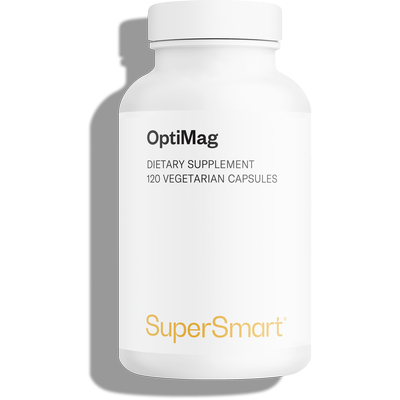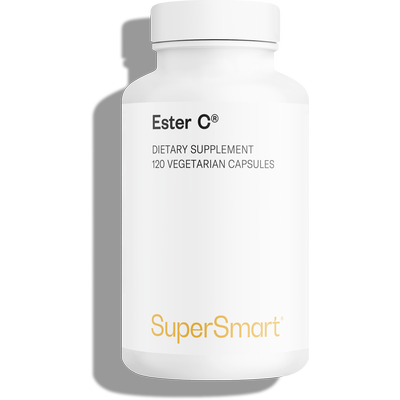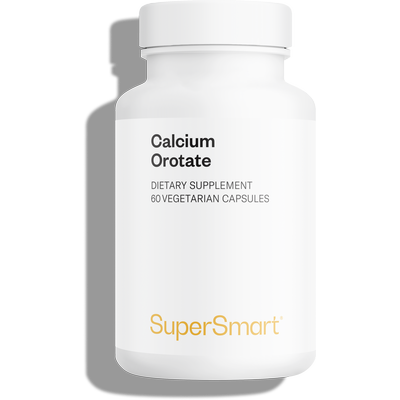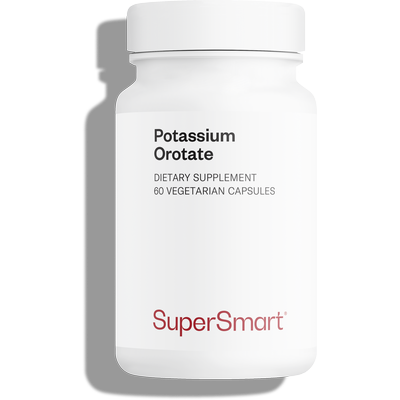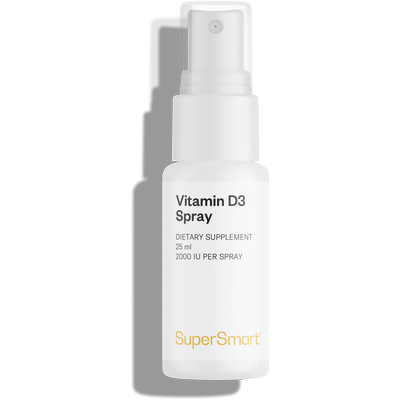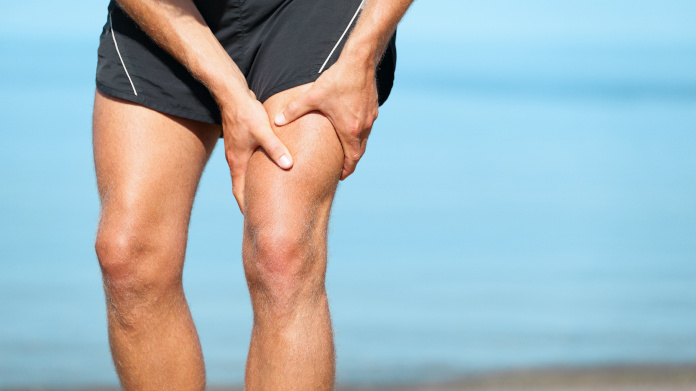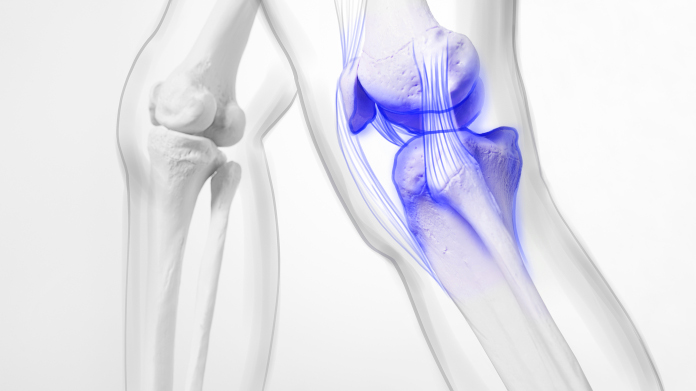What deficiency causes cramps?
Cramps are painful, involuntary muscle contractions. Find out which nutritional deficiencies increase the risk of cramps.

What is a cramp and how do you recognise it?
Cramps are very common, involuntary, sudden and painful muscle contractions.
They last only a few minutes and are not serious, but they can disrupt daily life when they are frequent and disabling (1).
They often occur when a muscle has been used in an intensive or unusual way (often the calf or foot muscles), during exercise, after exercise or during the night.
The pain can usually be relieved and the contraction stopped by stretching the muscle concerned.
Cramps can be confused with a number of muscular phenomena:
- muscle pain (myalgia), which does not lead to contractions and does not occur suddenly
- dystonia, a simultaneous contraction of agonist and antagonist muscles (e.g. the biceps and triceps at the same time) which can cause pain, but is often less severe than cramp
- muscle spasms, which are generally less sudden and triggered by noises, emotions or sensory stimuli (2)
What causes cramps?
For a long time, it was wrongly thought that cramps were caused by an accumulation of lactic acid in the muscles.
Today, the mystery is still unsolved, but two solid hypotheses hold the key to explaining exercise-related cramps (3):
- The sweating associated with prolonged exercise may lead to a loss of certain chemical components essential to muscle contraction (electrolytes), which are not compensated for by the drinks ingested.
- Muscular fatigue, linked to unusually intense exercise, is thought to lead to abnormal reflex excitation of certain neurons which innervate the muscle fibres responsible for contraction.
However, not all cramps are linked to exercise!
There are 5 different types, each with its own possible causes and predisposing conditions, such as shortages of certain electrolytes and neuromuscular disorders:
- idiopathic cramps, with no identifiable cause, often occurring at night, and increasingly with age
- paraphysiological cramps, linked to physical exertion and pregnancy
- cramps of metabolic or vascular origin (venous insufficiency, vitamin deficiencies, electrolyte disorders, etc.)
- cramps linked to neuromuscular diseases
- cramps linked to medication (diuretics, statins, beta-agonists, etc.) (4)
The list of deficiencies that can cause cramps
Potassium: essential for muscle contraction
Potassium is an essential mineral that contributes to normal muscle function.
It plays a role in muscle contraction by enabling the transmission of nerve impulses that trigger contractions.
Numerous studies have shown that a lack of potassium (hypokalaemia) can increase the risk of cramps, although it is not solely responsible for their occurrence.
Factors that can cause potassium deficiency:
- diabetes, and more specifically the use of insulin
- frequent episodes of diarrhoea, generally linked to excessive use of laxatives
- taking certain diuretics
- intense physical effort, especially in hot weather
Ways to prevent potassium deficiency:
- Eat fruit, vegetables and pulses (the best sources) every day to reach a minimum of 3500 mg of potassium per day: white beans, potatoes, apricots, prunes, tomatoes, squash, spinach, etc.;
- Drink sparkling water, which is richer in potassium, and possibly take potassium supplements (such as Potassium Orotate) under the supervision of a health professional;
- Avoid excessive consumption of foods, drinks and products containing liquorice, as it contributes to long-term potassium loss and increases the risk of muscle cramps.
Magnesium: the first choice for pregnancy-related cramps
Like potassium, magnesium is depleted during physical exercise.
Directly involved in muscle contraction, it contributes to electrolyte balance and normal muscle function.
Numerous studies have shown a correlation between magnesium deficiency and the onset of cramps.
However, just as a lack of magnesium alone does not cause cramps, prescribing magnesium does not appear to solve all the problems of idiopathic cramps (5).
Only cramps in pregnant women (6) seem to be relieved by such treatment.
This does not mean, however, that you cannot optimise your intake to reduce the risks.
Factors that can cause magnesium deficiency:
- loss of magnesium through sweat during physical effort, especially in hot weather
- repetition of stressful events
- excess alcohol, coffee and tea
- a diet too low in magnesium
Ways to prevent magnesium deficiency:
- Include more magnesium-rich foods such as pulses, seeds, nuts, wholegrain cereals, dark green leafy vegetables and seafood.
- Increase fibre intake to improve magnesium absorption.
- After exercise, opt for sparkling water, which is richer in magnesium, or still mineral water that has a high mineral content.
- Prepare food by steaming, cooking in a paper parcel or braising to prevent nutrients leaking into the water.
- Use the best magnesium food supplements (such as OptiMag) for regular intense physical activity (needs increased by 10-20%) or regular exercise in a hot, humid environment (gym), under medical supervision.
Vitamin C: less muscle fatigue after exercise
Taking vitamin C contributes to the normal functioning of the nervous system, but it also helps to reduce muscular fatigue: According to the most plausible hypothesis, it is precisely this fatigue that is at the root of exercise-related cramps.
A lack of vitamin C can lead to general tiredness and reduced resistance to infection, but it could also encourage the onset of cramps and aches after even the most trivial exertion.
It is estimated that adults need 110 mg per day, but 100 mg can be added for every 1000 kcal expended during physical exercise.
Factors that cause vitamin C deficiency:
- stress
- regular consumption of tobacco and alcohol
- a diet too low in fruit and vegetables
- repeated heating of food
- regular strenuous physical activity
Ways to prevent vitamin C deficiency:
- Plan to drink citrus juice before, after or during the meal following training (vitamin C acts in synergy with vitamin E, and increases the assimilation of iron).
- Increase your intake of vitamin C-rich foods by including raw foods (such as guava, orange, kiwi, mango, strawberries, grapefruit and pineapple) and steamed foods (peppers, broccoli, cabbage, peas, etc.);
- Opt for non-acidic vitamin C food supplements suitable for sensitive stomachs (such as Ester C, with 335 mg of vitamin C per capsule).
Iron: the cause of anaemia and cramps
Several studies have suggested the potential impact of a lack of iron on the onset of muscle cramps.
Iron is a nutrient well known to sportspeople, as it is involved in the phenomenon of overtraining.
Intense effort slows down its absorption because the stomach and intestine are forced to rest during physical exercise, At the same time, iron intake is often lower than the demanding needs of sportspeople: Iron contributes to the normal formation of red blood cells and haemoglobin, two proteins whose renewal is increased in these athletes.
In addition, sportspeople lose more iron than others through perspiration and microtrauma.
Women of childbearing age are particularly at risk because of menstruation.
Factors that cause iron deficiency:
- vegetarian, vegan and vegan diets, as the most easily assimilated sources of iron are found in animal products
- drinking tea, coffee, legumes, whole grains and fruit rich in polyphenols, while digesting iron-rich foods
- menstrual bleeding, microtrauma and injuries
- overtraining
Ways to prevent iron deficiency:
- Take iron supplements (such as Iron Bisglycinate) under medical supervision and after a blood test.
- Consume citrus juices or vitamin C supplements with iron-rich meals, to increase its absorption.
- Increase your iron intake by eating offal (especially black pudding), red meat, seafood (clams, oysters, etc.) and fish.
A few additional tips to reduce cramps
- Watch your calcium intake (for example with Calcium Orotate) and vitamin D intake (for example with Vitamin D3 Spray 2000 IU), as hypocalcaemia could have an impact on cramps (7).
- Increase your sodium intake slightly if you are involved in very intense physical activity (such as triathlons).
- Consume enough B vitamins (e.g. Coenzymated B Formula), which are essential for muscle metabolism and nerve transmission.
- Think about using carbohydrate and electrolyte solutions after intense exercise: they help maintain performance during prolonged endurance exercise.
- Do muscle stretching exercises of about 3 minutes every evening to limit idiopathic nocturnal cramps.
SUPERSMART ADVICE
References
- Miller TM, Layzer RB. Muscle cramps. Muscle Nerve 2005;32(4):431–442.
- Katzberg HD. Case Studies in Management of Muscle Cramps. Neurol Clin 2020;38:679-96
- Giuriato G, Pedrinolla A, Schena F, Venturelli M. Muscle cramps: A comparison of the two-leading hypothesis. J Electromyogr Kinesiol. 2018 Aug;41:89-95. doi: 10.1016/j.jelekin.2018.05.006. Epub 2018 May 26. PMID: 29857264.
- Garrison SR, Dormuth CR, Morrow RL, Carney GA, Khan KM. Nocturnal Leg Cramps and Prescription Use that Precedes Them: A Sequence Symmetry Analysis. Arch Intern Med 2012;172:120-6.
- Garrison SR, Korownyk CS, Kolber MR, et al. Magnesium for Skeletal Muscle Cramps. Cochrane Database Syst Rev 2020;9:CD009402.
- Katzberg HD, Khan AH, So YT. Assessment: Symptomatic Treatment for Muscle Cramps (an Evidence-Based Review): Report of the Therapeutics and Technology Assessment Subcommittee of the American Academy of Neurology. Neurology 2010;74:691-6.
- Weiker MK, Nielsen B, Waclawik AJ, Staples AC, Hansen KE. Muscle Cramps Do Not Improve With Correction of Vitamin D Insufficiency. WMJ. 2017 Dec;116(5):200-204. PMID: 29357208; PMCID: PMC6324187.
1 Days
great experience
Easy ordering, fast deliver, very professionally.
Natasa
4 Days
this company and its products are…
this company and its products are perfect: I have been their customer for three years , prices are reasonable for the high quality they offer , the products are of very good quality not just plainly "normal" , delivery is quite fast. we are very satisfied with them.
Gabriel Diacakis
5 Days
TOP service TOP products will buy again…
TOP service TOP products will buy again and again
PINOTTI Giorgio
7 Days
Trustworthy company with tested products
Trustworthy company with tested products
Trusted
11 Days
Efficiency and speed
Efficiency and speed
Cuccie
13 Days
GOOD BRAND IN FOOD COMPLEMENTS
GOOD BRAND IN FOOD COMPLEMENTS - SERIOUS WITH GOOD DOCUMENTS AND DETAILS SCIENTIST. AND SERIOUS HONNEST COMMERZIALISATION. I HAVE TRUST IN THEIR PRODUCTS.
FENOGLIO Guy
14 Days
Very good experience
Very good experience, the products arrived in time, in perfect condition and are good quality. Thank you.
GABI TIRCOCI
20 Days
very good expereince
very good expereince
Jelena Đaković
20 Days
Very good products.
Very good products.
Agnes BENDSAK
22 Days
Just OK
Just OK, ordering from company for many years and being safisfied
Lynn Mae
23 Days
Recomendo
Produtos encomendados são recebidos atempadamente e de acordo com o anunciado! Muito satisfeita!
Carla Sofia
23 Days
Everything is great!
Everything is great!
Jonas
28 Days
The delivery was fast and the product…
The delivery was fast and the product is great
SOMMARIVA Gianni
29 Days
Great service and lots of information
Great service and lots of information
Gabi
32 Days
Service Satisfaction
I’m satisfied with the service; it fulfilled what it set out to do.
Anfhony Abreu
of experience
your money back
##montant## purchase


